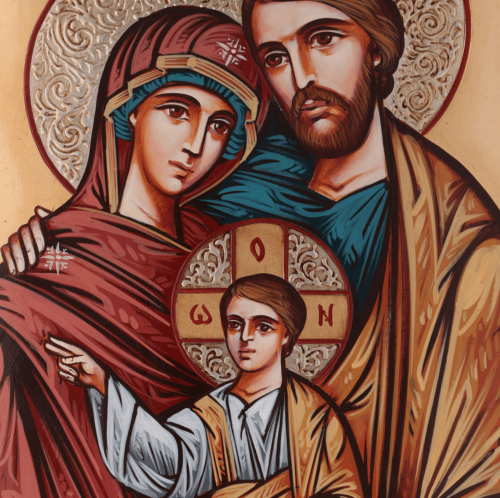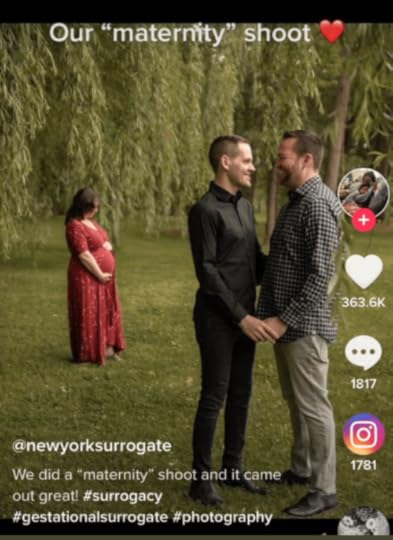Icon Of The Post-Christian Family
Liberal Evangelical professor Kristin Kobes Du Mez ain’t never gonna call me darlin’. I described the pro-LGBT Calvin professor as part of a group of “post-Christian Christians,” by which I mean Christians who are jettisoning bedrock Christian teachings to conform to the post-Christian order. She responded sharply. Excerpt:
It is in the interest of people like Dreher to erase the existence of any reasoned, nuanced, and principled middle ground. We see this around the issue of LGBTQ rights and inclusion, and, especially this week, around the issue of abortion. I think that is one of the reasons why I have become a target, not just for Dreher, but for others—particularly among the Christian nationalist wing of the evangelical world. And why I am routinely mocked for saying things like “it’s complicated.” Because their power depends on a stark binary, on a simplistic division of us vs. them.
As I chronicle in Jesus and John Wayne, this has been a throughline of conservative evangelicalism for more than half a century. A key moment in my research came when it dawned on me that the militancy of conservative white evangelicalism wasn’t primarily a response to fear, but rather a precondition for fear. I saw how militancy required the continual stoking of fear: fear of outsiders, of secular humanists, feminists, Muslims, Democrats, immigrants, the list goes on and on. This is how we can make sense of the strange phenomenon of the fake “ex-Muslim terrorists” who were all the rage on the post-9/11 evangelical speaking circuit, long after they had been exposed as utter frauds. This is how we can make sense of the combativeness of Mark Driscoll and Jerry Falwells (father and son). This is how we can make sense of not just the positions but also the posture and tactics of the Christian Right. Militancy requires fear. In the absence of a real threat, a new threat must be manufactured.
The greatest challenge to this system are those who threaten to expose it for what it is. Those who remind fellow Christians that the Bible tells us not to fear. Those who seek to live obediently with humility—humility that, in discerning how to live as faithful Christians, we will inevitably get things wrong, but that we can nevertheless remain secure in the knowledge that God’s truth is not dependent on our perception of that truth.
To be clear, none of this means that doctrine isn’t worth debating, that boundaries around orthodoxy aren’t significant, or that all political and social views are equally valid. But if I may make a theological claim, let me assert that to use doctrine or discussions around orthodoxy as cudgels is not the way of Christ.
Well, for readers who come to this post of mine via Twitter, without familiarity with me, I am not an Evangelical, nor have I ever been an Evangelical. But I am white and conservative, so she’s got that right.
More importantly, this is standard liberal speak. She just wants to have a dialogue about whether or not Christianity is compatible with affirming same-sex attraction, same-sex marriage, and the like. Why (she asks) are people like me so afraid of dialogue?
I don’t know Prof. Dumez, so it’s certainly possible that she sincerely can’t figure this out. I mean, that she’s being straightforward here, and doesn’t see this as a tactic to disarm opposition to her radical revisionism of the Christian faith. I’ll assume good faith on her part. The answer, in that case, is that we cannot have dialogue on something that, if normalized within Christianity, will destroy it.
For one, look at every church where LGBT has been normalized and affirmed by the church. How are they doing? Are they growing? Are dissenters within the institution respected?
For another, normalizing homosexuality is profoundly anti-Biblical — and not just because of Scriptural citations clearly damning homosexual behavior. At a deeper level, the Bible teaches us that the family is an icon of the Holy Trinity, which is to say, of God. The generativity of the life of God is seen in the generativity of the natural family. The receptivity of the female to the male results in new life, and in cycles of new life. Remember that Mary accepted the act of the Holy Spirit that conceived the Messiah. You don’t have to be a believing Christian to recognize the meaning of the Incarnation, and the symbolic importance of the natural family to Christianity.
Here is an icon of the Holy Family:

Today, in the post-Christian West, we have this icon:

The two gay narcissists staring into each other’s eyes. The woman who has rented her womb out to them, relegated to the background, as the men’s accessory gestates within her. It is sick stuff — and it’s not just a gay thing. Straight couples use surrogacy too. It ought to be outlawed as an abomination.
If what you see in that iconic image above is a family, just as valid and truthful as the natural family, then the Christian order falls apart. God gives us the natural family to disclose something to us about Himself. I suppose liberal, nominalist Protestants like Du Mez don’t believe that, but this has been the teaching of the Church for many centuries. Though Du Mez taunts Christians like me as driven by “fear,” she’s not wrong: I really do fear what heretics like her are doing to the faith, and to institutions that are supposed to guard and pass on the faith. Christianity is not just a set of moralistic, therapeutic opinions about who God is and what He expects of us. For many of us, it is the ground of Reality. Iconoclasts like Du Mez are profoundly destructive. You ought to fear what they do. If you read her piece, she positions people like herself as caring — indicating that those who hold the line on fundamental Christian teaching regarding homosexuality are hard-hearted bigots.
This is how her side rolls: calling those who disagree bigots, on the grounds that the only reason why anyone would defend orthodox Christian teaching on these matters is irrational fear and loathing. Anyone who has seen how liberals work within Church institutions these past few decades knows these tactics, and this strategy, well. It’s very, very effective, too. Again: if you’re a conservative who is afraid of it, you should be congratulated for having paid attention to how well it works in practice.
What the icon of the post-Christian family signifies is a social order in which the gestation of human life has been entirely commodified. Where women are turned into brood mares for rich people. Where children become lifestyle accessories. Where there are no moms and no dads, only “parents” — as many as you like, because “family” is whatever we say it is.
Mary Harrington, the self-described “reactionary feminist,” gets it right:
Thank goodness we don’t have a totalitarian religious ideology, complete with public festivals, to justify the erasure of women. Or we really would be in a Handmaids Tale type dystopia pic.twitter.com/lcvDPLg5XD
— Mary Harrington (@moveincircles) June 26, 2022
And to all the people losing their minds at this tweet because they still think the Holy Feast of Pride is about dignity for same-sex attracted people: you’re being exploited, as stalking-horses for an ideology that doesn’t give a stuff about you https://t.co/l2ERu7q07b
— Mary Harrington (@moveincircles) June 27, 2022
This is what Kristin Kobes Du Mez and her liberal post-Christian Christian colleagues are trying to normalize. They’ll deny it, but once you have accepted a flexible definition of marriage and family, and claim it as Christian, where do you draw the lines? Where do you say, “this far, but no further” — and why?
The post Icon Of The Post-Christian Family appeared first on The American Conservative.
Rod Dreher's Blog
- Rod Dreher's profile
- 502 followers



